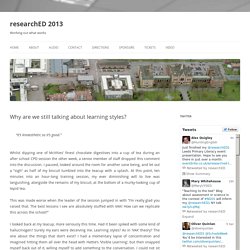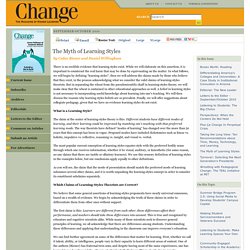

The lesson you never got taught in school: How to learn! A paper published in Psychological Science in the Public Interest evaluated ten techniques for improving learning, ranging from mnemonics to highlighting and came to some surprising conclusions.

The report is quite a heavy document so I’ve summarised the techniques below based on the conclusions of the report regarding effectiveness of each technique. Be aware that everyone thinks they have their own style of learning (they don't, according to the latest research), and the evidence suggests that just because a technique works or does not work for other people does not necessarily mean it will or won’t work well for you. If you want to know how to revise or learn most effectively you will still want to experiment on yourself a little with each technique before writing any of them off.
Elaborative Interrogation (Rating = moderate) A method involving creating explanations for why stated facts are true. An example of elaborative interrogation for the above paragraph could be: Reference: Why the Widespread Belief in 'Learning Styles' Is Not Just Wrong; It's Also Dangerous. Earlier this year on this blog, we addressed the problem of neuromyths including the belief held by 93 percent of British teachers that "learning styles" exist.

A new TED talk by Dr. Tesia Marshik, who is an assistant professor of psychology at the University of Wisconsin-La Crosse, walks us through the extensive evidence that learning styles don't exist, before looking at why the belief is so widespread and exploring how the belief can indeed be dangerous: "When something is so pervasive it doesn't even occur to people to challenge it. We need to be willing to critically reflect on beliefs even if they are commonly believed.
Learning Styles Don't Exist. Why are we still talking about learning styles? “It’s kinaesthetic so it’s good.”

Whilst dipping one of McVities’ finest chocolate digestives into a cup of tea during an after school CPD session the other week, a senior member of staff dropped this comment into the discussion. I paused, looked around the room for another sane being, and let out a “sigh” as half of my biscuit tumbled into the teacup with a splash. At this point, ten minutes into an hour-long training session, my ever diminishing will to live was languishing, alongside the remains of my biscuit, at the bottom of a murky-looking cup of tepid tea.
This was made worse when the leader of the session jumped in with “I’m really glad you raised that. The best lessons I see are absolutely stuffed with VAK! I looked back at my teacup, more seriously this time. In that moment I realised how Alice must have felt at the mad hatters tea party. As the conversation descended deeper into madness, I sat back and wondered just how this situation was even possible. Changing mindsets. PLOS Medicine: Why Most Published Research Findings Are False. Abstract Summary There is increasing concern that most current published research findings are false.

The probability that a research claim is true may depend on study power and bias, the number of other studies on the same question, and, importantly, the ratio of true to no relationships among the relationships probed in each scientific field. In this framework, a research finding is less likely to be true when the studies conducted in a field are smaller; when effect sizes are smaller; when there is a greater number and lesser preselection of tested relationships; where there is greater flexibility in designs, definitions, outcomes, and analytical modes; when there is greater financial and other interest and prejudice; and when more teams are involved in a scientific field in chase of statistical significance.
Simulations show that for most study designs and settings, it is more likely for a research claim to be false than true. Published: August 30, 2005 Copyright: © 2005 John P. Change Magazine - September-October 2010. By Cedar Riener and Daniel Willingham There is no credible evidence that learning styles exist.

While we will elaborate on this assertion, it is important to counteract the real harm that may be done by equivocating on the matter. In what follows, we will begin by defining “learning styles”; then we will address the claims made by those who believe that they exist, in the process acknowledging what we consider the valid claims of learning-styles theorists. But in separating the wheat from the pseudoscientific chaff in learning-styles theory, we will make clear that the wheat is contained in other educational approaches as well.
A belief in learning styles is not necessary to incorporating useful knowledge about learning into one's teaching.